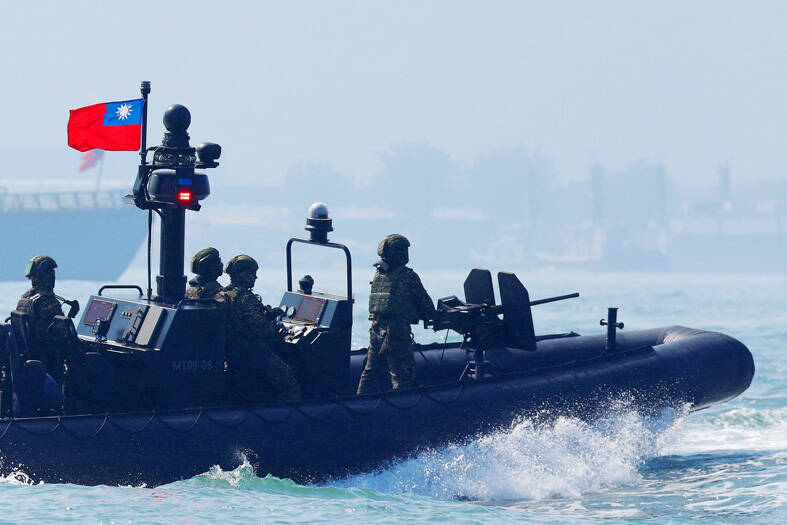Democratic Progressive Party (DPP) lawmakers have proposed an amendment to toughen penalties for military officials found guilty of treason.
Current punishments are too lenient and do not serve as a deterrent, legislators told a meeting of the Legislative Yuan’s Foreign Affairs and National Defense Committee yesterday, citing the case of former army colonel Hsiang Te-en (向德恩).
Hsiang was found guilty of accepting bribes and signing a letter of surrender swearing allegiance to the People’s Republic of China as his “motherland.” The Kaohsiung District Court in February last year sentenced him to seven-and-a-half years in prison and ordered him to pay NT$560,000, the equivalent of what he received in bribes.

Photo: Carlos Garcia Rawlins, Reuters
DPP legislators Wang Ting-yu (王定宇), Michelle Lin (林楚茵) and Chen Kuan-ting (陳冠廷) proposed increasing the sentences for military officials found guilty of treason from the current one to seven years in prison to three to 10 years.
In Hsiang’s case, the Ministry of National Defense initially suggested that he be tried for contravening Articles 17 and 19 of the Criminal Code of the Armed Forces (陸海空軍刑法), the legislators said.
“However, the Kaohsiung District Prosecutors’ Office, which handled the case, only tried Hsiang for the crime of corruption, for which there was clear evidence,” they said.
“China’s efforts to infiltrate Taiwan are becoming an increasingly serious problem, but espionage cases are tried too leniently, and that poses a national security risk,” they added.
Although Hsiang’s willingness to surrender to China would affect troop morale, current laws do not stipulate penalties for such acts committed during peacetime, the legislators said.
“If active-duty military personnel can freely commit such violations of their sworn loyalty to the nation, it would be difficult to prevent defection and enemy infiltration in wartime,” the legislators said.
Penalties for crimes related to aiding an enemy in the Criminal Code of the Armed Forces should be revised with reference to provisions for the crime of foreign aggression in the Criminal Code, the legislators said.
Specifically, stricter penalties should be implemented for those who “prepare or conspire to deliver military facilities or items to the enemy, engage in espionage activities for the enemy, or assist the enemy’s spies to engage in such activities,” the legislators said.
The proposed amendment would also increase prison terms to up to seven years for those who intend to destroy military facilities and items, damage or block water and land routes, give the enemy a military advantage, harm Taiwan or its allies through actions that would put their respective militaries at a disadvantage, or surrender to the enemy, the legislators said.

INVESTIGATION: The case is the latest instance of a DPP figure being implicated in an espionage network accused of allegedly leaking information to Chinese intelligence Democratic Progressive Party (DPP) member Ho Jen-chieh (何仁傑) was detained and held incommunicado yesterday on suspicion of spying for China during his tenure as assistant to then-minister of foreign affairs Joseph Wu (吳釗燮). The Taipei District Prosecutors’ Office said Ho was implicated during its investigation into alleged spying activities by former Presidential Office consultant Wu Shang-yu (吳尚雨). Prosecutors said there is reason to believe Ho breached the National Security Act (國家安全法) by leaking classified Ministry of Foreign Affairs information to Chinese intelligence. Following interrogation, prosecutors petitioned the Taipei District Court to detain Ho, citing concerns over potential collusion or tampering of evidence. The

‘FORM OF PROTEST’: The German Institute Taipei said it was ‘shocked’ to see Nazi symbolism used in connection with political aims as it condemned the incident Sung Chien-liang (宋建樑), who led efforts to recall Democratic Progressive Party (DPP) Legislator Lee Kun-cheng (李坤城), was released on bail of NT$80,000 yesterday amid an outcry over a Nazi armband he wore to questioning the night before. Sung arrived at the New Taipei City District Prosecutors’ Office for questioning in a recall petition forgery case on Tuesday night wearing a red armband bearing a swastika, carrying a copy of Adolf Hitler’s Mein Kampf and giving a Nazi salute. Sung left the building at 1:15am without the armband and apparently covering the book with a coat. This is a serious international scandal and Chinese

Seventy percent of middle and elementary schools now conduct English classes entirely in English, the Ministry of Education said, as it encourages schools nationwide to adopt this practice Minister of Education (MOE) Cheng Ying-yao (鄭英耀) is scheduled to present a report on the government’s bilingual education policy to the Legislative Yuan’s Education and Culture Committee today. The report would outline strategies aimed at expanding access to education, reducing regional disparities and improving talent cultivation. Implementation of bilingual education policies has varied across local governments, occasionally drawing public criticism. For example, some schools have required teachers of non-English subjects to pass English proficiency

TRADE: The premier pledged safeguards on ‘Made in Taiwan’ labeling, anti-dumping measures and stricter export controls to strengthen its position in trade talks Products labeled “made in Taiwan” must be genuinely made in Taiwan, Premier Cho Jung-tai (卓榮泰) said yesterday, vowing to enforce strict safeguards against “origin laundering” and initiate anti-dumping investigations to prevent China dumping its products in Taiwan. Cho made the remarks in a discussion session with representatives from industries in Kaohsiung. In response to the US government’s recent announcement of “reciprocal” tariffs on its trading partners, President William Lai (賴清德) and Cho last week began a series of consultations with industry leaders nationwide to gather feedback and address concerns. Taiwanese and US officials held a videoconference on Friday evening to discuss the